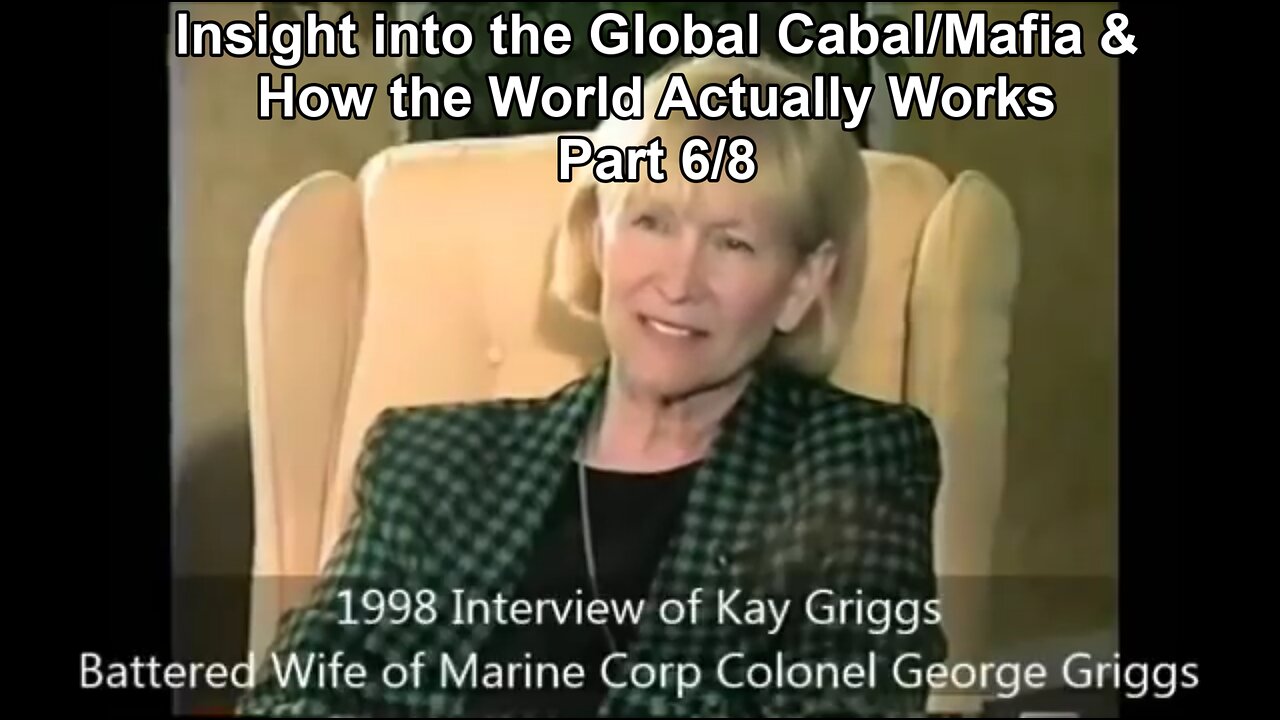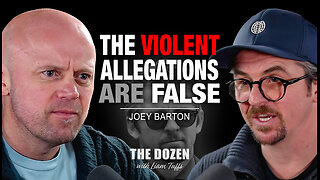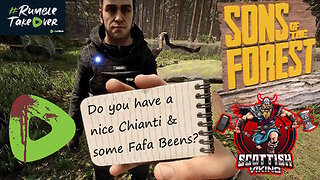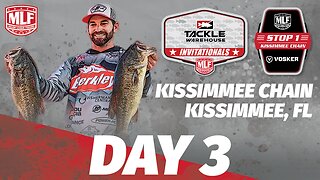Premium Only Content

The Kay Griggs Interviews, Part 6/8 - Disclosure of the Global Cabal/Mafia (Timestamped)
The Kay Griggs Interviews, 1988, Part 6/8 - Disclosure of the Global Cabal/Mafia (Timestamped)
This series of interviews is probably one of the most important pieces of modern disclosure that's public into how the world actually works. Many of the "heroes" and celebrities of the "alternative media" sphere that are highly platformed (e.g. Whitney Webb, Alex Jones, Ian Carroll -- among others), will not talk about this interview although they know of it.
In Webb's case, and I'm just using her as an example, she's from a wealthy "cabal" connected family and is a trust funder. Her publisher is Mint Pres which is tied to Chatham House/The Royal Institute of International Affairs, the policy arm of the Committee of 300. You'll get good info from her, but it's allowed info.
Summary
Introduction of The Widows (00:01-00:46): Discussion surrounding the book The Widows, which tells the real-life story of four spies who were murdered, including references to their connections to U.S. military intelligence and double agency work.
Allegations Against Kissinger (01:24-03:26): Claims about Henry Kissinger's homosexuality and misconduct, including an accusation of sexual assault during the Cambodian campaign, which allegedly ruined the lives of multiple young men.
Personal Experiences in the Military (05:07-06:57): The speaker shares a personal account of being flagged by military officials for resisting inappropriate behavior within a military context and discusses the moral implications of such behavior.
Corruption and Cover-Up Allegations (08:15-10:37): Accounts of how military cover-ups led to the death of spies and the speaker's suspicions that high-ranking officials, including George Bush, had connections to these events.
Connections to Powerful Figures (18:17-39:03): The narrative explores connections to elite groups, including the Council on Foreign Relations and Masonic organizations, while mentioning various political figures' ties to the military and clandestine operations.
Abuse and Violence (47:01-56:02): The speaker recounts personal experiences with domestic violence linked to her husband’s military background, highlighting the profound emotional and psychological impact of such trauma.
Final Thoughts on Military Operations (57:19): The conversation shifts to a discussion of military training facilities for assassins and covert operations, indicating a broader concern about the hidden actions of military and intelligence agents.
Transcript:
(00:01) They did dress up. They were in that movie in complete drag in a real weird thing. I'm sure that struck a lot of people as very odd that these people would be homosexual. But actually the movie very evidently, very frankly brought that across. What's interesting to me is this book, The Widows, has four spies, double agents who worked for the United States and Soviet satellites or whatever who were murdered.
(00:46) And they worked for the sort of the Navy and the Army and one of them was a man who was murdered outside of the Army's intelligence headquarters outside of Washington and in a Holiday Inn, I think it was. And just before he was murdered, he called his wife back in El Paso and said, the Army is going to kill me. They're going to kill me. Well, he was murdered and the Army did kill him. Now, this is a fictional account or this really happened?
(01:24) It actually happened. I was saying the book, The Widows, is not fiction then? Oh, no. It's all... Golitsyn, the spy Golitsyn was in there. There were a couple of others, Paisley, who was murdered almost like this other man. Paisley was murdered like William Colby. Paisley was also hanging around with homosexuals. He went to the Rush River Lodge. That is the one... So did Bob Woodward. Bob Woodward, you know. The reporter?
(01:56) Yeah. Yeah. Henry Kissinger was a well-known, totally a homosexual, not even both ways. And so his wife is a marriage of a cover, a convenience. Oh, it's just a convenience. Yeah. And he might, you know, maybe he's discovered women in his late age, I don't know, but no, I heard through a very well-grounded German that Henry's best friend's father told Henry to stay away from him and that's why Henry left. The family were embarrassed and Henry went to Britain where they did this and then changed
(02:36) his name from Heinz to Henry. And I interviewed a man named Bob who's an army enlisted person who told me about Henry in Cambodia. So he, up through Cambodia, he was actually raping young men. And of course, that experience destroyed the lives of these five young men, according to the source. I mean, he said he was crying and this man was a perfectly wonderful, functioning, young married man who worked for a newspaper on the eastern shore and had three young children,
(03:26) went to Vietnam as an enlisted man, was put in Cambodia, which he said he was, it was a lie living there, and then ran into Henry Kissinger, or Henry Kissinger ran into him and did certain things to him, invited him into his tent with some other men. It was horrible, but it was, you know, he said it's wartime and so forth. But he said, you know, I could have taken it mentally if it had been a bunkmate or something.
(03:57) But he said, when it's someone like Henry Kissinger who does it to you, you're ruined. He said, I could never, he said he came back home, oh, and this is interesting, and I really believe that Bob's right. He said, Kissinger said to him, if you ever tell anybody, if you ever mention his soul, this is, it's the end of you, don't you ever tell anybody. Well when he got back, when Bob got back, he went to a special hospital and they were
(04:31) going to keep him locked up forever. Bob? Bob. A lot of the other boys just, you know, my feeling is that he was flagged the way I was flagged when General Gray and, you know, Wilhelm had me flagged because I broke up the go-go dancing in the officer's club. I was labeled a troublemaker because I thought it was wrong for married men to be going out with topless go-go dancers in the officer's club dining room and I took pictures of it
(05:07) and my husband, you know, got really mad and so forth. And these pictures today are still with you or they're missing? Oh no, my husband, what happened, I had the pictures, I risked my life because he tried to grab the camera from me. I hid it in the women's bathroom and he tried to get it from me. We had a terrible fight that night. He wanted the pictures and, I mean, I prevailed. I developed the pictures, wrote a very nice southern letter, wrote the letter to the club
(05:42) manager saying I didn't think it was proper, had three sets, actually four sets of the three photographs I took made and I sent a copy of the letter and the photographs to the base commander's wife and to the commandant's wife and it was stopped. But I was flagged, so I know, but this was before tailhook and yet instead of being congratulated for helping family values, for standing up for the wives, for showing the Marine Corps
(06:20) the proper place to have nudity and debauchery is not in the dining room of Camp Lejeune. And my husband said, well, this is nothing compared to Okinawa, you just have to get used to it, he told me. Now I was a colonel's wife, these were young majors, and they were seeing me being talked down to. What do you think it did to them? It demoralized them, the Marine Corps was demoralized. The wives were demoralized and I did what was right, what Jesus Christ would have done.
(06:57) How can they call themselves Christians and condone, how can Al Gray and Wilhelm and Cook and my husband condone this kind of behavior and flag me as a weirdo? So there's something, and that's where I'm standing, I'm standing on what I know Jesus Christ would have done. And if they want to, you know, continue to hound me because I'm telling truth, well, that's just the way it is, because I'm not going to lie and develop a different kind
(07:35) of personality just to please them. But anyway, that happened. Well, it's certainly honorable. So then the book, The Widows, continues with... Yes, and I contacted this woman. There was a detective who had to be hired. She knew he'd been murdered. The Army covered everything up. She had an independent investigator. And the interesting thing which happened was that she worked in a toy shop. This isn't in the book.
(08:15) She told me this over the phone. This is Mrs. Yeah, his name, it's like Klein. Well, anyway, yeah. Anyway, he's a... I'll think of it in a minute, hopefully. But she worked in a toy shop, and they were scoping her out. And this was just after the... No, no, it was before he was murdered. It was before he was murdered, because she said she told her husband about this. George Bush and his wife came into her shop and were looking at her.
(09:07) Now, I don't know what that means, but they don't live in El Paso. Why? And he was doing all of the Russian, Mexican, Trotsky kind of work for... George Bush? George Bush. No, no, this guy. This guy? Yeah. Now, this is while George was CIA director? Right. I believe he... Yes, I believe he was CIA director then. The interesting thing to me was that why would he scope the wife? Why would he bring Barbara in? Did Barbara know?
(09:45) Was he just using Barbara as a... But she was being observed, and it was shortly before he was murdered. And I know... know that Parker Host, my husband's friend, has dealings with George Bush. So, I don't know. I know there's a lot to do with oil and Aramco and Texas and all of that. I know it's very complex, but where I draw the line is murder and assassination and corruption and lies and deception and cruelty to innocent women and children and families just because
(10:37) they're not elite. Just because, now, Mrs. Bush is in the Colonial Dames, so is my mother. Colonial Dames is a very elite group of women, they think they are, who are descendants of George Washington's aides. They own George Washington's ancestral home, Solgrave Manor in Great Britain. They have Wilton in Richmond, which is an old house where Lafayette visited. I know there's a connection with Lafayette and the Masons, and I know there's a big
(11:22) Mason contingent in the Warfare Selling Group, because the head admiral in Norway, Eicham, no, I think, no, no, no, not Eicham, because he was, he's in charge of the prisons which have the drug lord. He's running the drug lord out of his prison, and he's a friend of George's, Newt Eicham. They were talking about this, as though I would know about it, you know, and he has a house or a cottage right outside of Kolsas, Norway, which is
(11:58) where they have their underground, one of their underground bunkers. They have one in Narvik, and they do a lot of the cold-weather training NATO does up there, but I know they're doing weapon shipments out of Norway. Okay, we'll call this a wrap for... I'm tired. You have done a stellar job. Well. You have done a stellar job. Okay, now we're on the clock. Who have we got here in this picture? All right, let me just put this here.
(12:39) This individual here is, his name now is Rockland Williams. He's a South African, quote unquote, general, who was with the army, the white army in South Africa, who was actually a double agent for Mandela's forces. He's an assassin, a murderer, and... Did your husband tell you of any murders that he committed? Any people or any situations? He stayed there with us. He was a guest of the State Department, and my husband arranged...
(13:19) This is my husband here. This is a gal in our church, Carla, whom I thought would be interested in going along with us that day because of the South African connection and Mandela and so forth. She's another battered military wife who lost a child, and anyway, she is a very bright lady, and we... And this guy's name again is? Rockland Williams. He studied in Great Britain after this. Does he have any other name?
(13:56) He is very interested in Ireland. I think he's basically sort of part of that IRA kind of underground, but his father, interestingly enough, came over to North Carolina as one of the sort of underground trainers, trainees during World War II. They had a number of training bases for communists in this country, and his father trained and lived in North Carolina, but was not from America, which is interesting.
(14:35) All right. Now, we're on the picture in the right, an individual laying down. That's your husband? Yeah. My husband was a rage-aholic. During Vietnam, he had to kill a number of people and lots and lots of people, and he was suffering from post-traumatic stress syndrome, and the interesting thing to me is that he cannot control himself when he is drinking, or either at odd times he goes into what's called a berserk state.
(15:07) Okay, so this is one of his past outstanding... Yeah, yeah, and yet he was chief of staff of the... This picture is of me and Sarah McClendon and General Carl Mundy, who became the commandant of the Marine Corps after Al Gray, for whom my husband was chief of staff. This was at a party at 8th and I Street at the Marine Corps commandant's house. It was a garden party for the Secretary of Defense. He's a good guy or a bad guy?
(15:46) Oh, bad guy. I mean, he knows what's going on and doing nothing about it, ordering hits and... And where was this taken again? It was in Washington, D.C. at the Marine Corps commandant's garden party in August of 1996. It was a garden party for the Secretary of Defense and the Marine Corps commandant, Krulak. Who would have taken this picture? One of the military photographers, but they stole... I had at least six pictures of that garden party,
(16:21) and I would, because they were coming in my house and stealing pictures, this is the only one I have of that, but it's a picture of a picture, because they didn't want me to have any proof that I had been there, but I was there. This is a picture of my husband's, supposedly his retirement from the Marine Corps, which you never retire, according to my husband, from the Marine Corps. You're always a mercenary, and you work under the New Orleans 4th Marines,
(17:01) which are under a different kind of law than our country. Napoleonic law is the law of Louisiana, and my husband was always going down to Louisiana. They have a training school for assassins. They kind of hop around from Lake Pontchartrain to here and there. This is General Al Gray, who was the commandant of the Marine Corps at that time, when my husband retired. My husband was his chief of staff. This is my husband, George Raymond Griggs.
(17:38) Hang on just a second. Let's get a good shot of Gray here. Okay, who's the guy next to Gray? This is my husband's son. He's not quite right. Yeah, he's kind of a little bit of a... He's not right. And the lady? That's the commandant's wife. He married her very late in life because he needed a third star. Now, who's the commandant? Al Gray, and her name is Jeanne Gray. Is she a good lady? Has potentials? She has potentials. She worked for him in his...
(18:17) See, even when he was general, he ran an intelligence operation, which was a contract organization, trying to hook politicians and get them. What is the word? In other words... In generalizing situations? Yes, yes. He has and still had and still has an organization, which brings in whores, prostitutes, whatever you want to say, who will compromise politicians so they can be used. Jeanne worked for him in that organization,
(18:58) which was not part of the military. She was a hooker. Well, I don't know. She chained smokes. She sleeps with the dogs and stuff. But when his mother was ill, when he was at FMF Lant, Fleet Marine Force Atlantic, Jan came to stay with his mother because she was on sedation and she may have talked too much to keep an eye on the mother. And then he married her because he would not have gotten his third star or whatever without having been married because he is a homosexual.
(19:36) He's a well-known group sex homosexual. And that's my husband. That's me. And that's my son, Garland, who's now married. And I have two grandchildren. This is a copy of my husband's diploma from the NATO Defense College at Rutgers. The Kay Griggs Interviews-1998-Satanism in the Military-1998-Satanism in the Military-1998-Satanism The Kay Griggs Interviews-1998-Satanism in the Military-1998-Satanism in the Military-1999-Satanism
(21:00) I just heard about Marschenko was going to be at a book signing and I kind of was curious to know whether he had even known George and so forth and he did and that's a picture of me with Richard Marschenko and his father was of course one of these mercenaries who came to work for our country and if you read any of his books you know that they do everything they want, there's no right or wrong and then these guys are churned out.
(21:25) Now this I have in here because this is about the royal family of Saudi Arabia and my husband was, this is how my husband got in his power because my husband went to a private boys school on scholarship he was hooked the same way Oswald was, homosexually and the Saudi, the three oldest Saudi boys were also hooked homosexually. The first one to come over after the uncle had been murdered because uncle was a really good guy and he favored the British.
(22:15) So these saboteurs, these communists who were... Now when you say uncle you're not making a reference like man from uncle are you? No the uncle of the Saudi royals. I just wanted to say can I continue that television series? But Mansoor was killed, it was Mansoor who was poisoned in Paris and my husband went to school with him and now there's one of them involved with the Marine Corps. This is the recruiter for my husband, I'm sorry it's not a better picture but it was faxed
(22:55) to me and they took the originals, this was a copy of an old one and they took it and he was a homosexual, Borland was a homosexual. Okay I need you to hold it up about two inches, there that's close. Charles Caddock died in the Saudi, one of the Saudi mansions outside of Marseille where they used to have the group sex orgies, it's a place called Es Le Rose. Okay. Okay, I think that's, then we get into the diary.
(23:37) What's this here? Oh yeah this is one of my husband's friends whom I talked to about some things that were going on, he was on the ship with my husband, Ed Townley. Did you mention any of these to him? No I didn't mention Ed Townley, let me see if there's anything here. When I was going through, they've taken so many of the originals, I met with Ollie Whipple, now Ollie Whipple is another marine intelligence person who told me about Dale Dorman.
(24:25) Okay do we have any pictures? No. All we need to reduce on this tape here is pictures. Okay. Or documents that are significant to anything we might have discussed. Englehart, my husband's getting mail for an Englehart and I know that there's a connection, money's being laundered. This is a presidential citation, copy of one from my husband. Okay. Oh and this number is important because this is not his social security number
(24:59) and you can find out a lot by that number. I think it's either 077-170 or, but that number you can find out a lot about my husband from that. Oh here it is, 077-670. Let me notice this. Oh. These are certificates of what? When he rises in rank. Oh I see. From one rank to the other. We went from colonel all the way back. I see. He was, oh let's see. The next step after colonel is? General. General. He didn't make general because of his wife's mishap.
(25:54) Yeah. That kind of put him back a little bit. You missed him, huh? No. No, I mean his first wife. Oh. Her death, which was nuts. Here he was with the U.S. Defense Liaison Group in Indonesia where they were training assassins on Timor. They have a little factory for assassins and terrorists that was started by Mountbatten. Okay. Okay. This is NATO headquarters. Oh. These are notes by a Marine Corps friend of his from Princeton
(26:43) who was in his class and who helped me a little bit to understand what was going on. This is interesting in his handwriting because it says, Robertson says Kay has spoken of abuses, George spending up to the limit, $33,000 on credit cards. He says an intervention often might be good. J.R., Jim Robertson, is disturbed by Kay's stories. And this is J.R.'s number. Well, who is Jim Robertson now but the head of the Justice Department Criminal Division?
(27:21) And this is in his handwriting. They've taken the originals. Mike Kimmel was mentioned to me by Jim Proctor who has written this. Mike Kimmel is the son of the famous Admiral who was the head of Pearl Harbor at the Pearl Harbor bombing. And my theory is that these guys take the sons of generals and then they suck them into their little thing. Jack Herman, in the dark. Jack Herman was my husband's roommate from Brooklyn
(27:57) whose father was Barbara Streisand's doctor and who is really literally kind of a basket case since he graduated from Princeton. Siegel is the president of the class. John Wilhelm, I think he's related to Charlie Wilhelm whom my husband's now working for. He's in intelligence. We have a picture of him in the reading room. Yeah, we do have a picture of John Wilhelm. Murdered or something happens to me. And I'm really scared when I talk about this.
(28:31) It's all right. The more you talk about it and the more people know, the more safe you are. This guy, his name is V.W. Wooten. He was a, and his son Wallace, he said it was his son. This is the license number, ZYF3977 Kreisel, LeBaron, Maroon. The time, it was 530, 96, 2 o'clock from about 2 until 430 in the afternoon. They were parked there and on his clipboard he had personal data. He had a book entitled Religions of the World.
(29:06) He was obviously studying Islamic religions because that was, you know, what the thing. New Army P. Green Coats, his curriculum vitae, and he had 21 years of service with the Air Force. Among the top, I couldn't read the rest of that. Experienced 1992 to present. Chief of Security, K.I. Sawyer. Commander of 350 persons. Provides protection, top secret security. Education master's degree, bachelor's degree.
(29:37) Squadron officer, Air Force Staff College. Fundamentals of total, probably total quality, I don't know. Awards, Air Training Command. Member of the Marquette. He's a fraternal order of police member. But this is interesting. 1991 to 1992, Provost Marshal at Keflavik, Iceland, which is where all of the The drug smuggling and stuff goes through that airport. Staff supervisor of 500 people briefed U.S. Ambassador during the visit of the Pope John.
(30:12) This guy again is who? Guarding my neighborhood. V.W. Wooten? Wooten. Yeah. This is just a letter from Jim Proctor to Mike Kimmel, who is the son of the famous Admiral Kimmel, World War II's, you know, the bombing of Pearl Harbor. And it says, it seems George has recently disappeared from home for short periods. Kay's trying to talk to everyone she believes who knew George better than average, both in reference to where he might be and, in perhaps a more important sense, what makes him tick.
(30:58) Apparently his pattern predates their marriage by quite a lot. She's coming to Washington sometime the week of March the 4th through the 9th, but at a minimum she would like a call from you. Her number in Virginia Beach is that. I saw your picture in the 35th reunion book, Sailing Off Shady Side, blah, blah, blah. And both of these were Princeton roommates of my husband. This is from the Princeton military ROTC book,
(31:32) which has the names of the men who were commissioned in the Marine Corps at the time my husband was. There's George Raymond Griggs, and there's Jim Proctor, who's handwriting in letter to the other guy. And Tom Lewis, I think, is in there. These are just more notes. This is a medical complaint. After I was battered and beaten, I tried to get copies of my pictures. They wouldn't let me have them. From the medical?
(32:04) Yeah, they wouldn't. These are just some little things about—it's not that important. I was just writing down things I remembered. I don't think this is really—this is just about some of his background. Yeah, no, this is not really—these are just some legal things. Oh, one—yeah. I had so many break-ins in my house, and this was one, and they always had a Marine, 20-year Marine as a police officer, who would interview me and say,
(32:44) oh, well, there's nothing wrong, you're just imagining things. Well, this particular incident, they were SEALs. They were dressed in black. They were amphibious men. My neighborhood is surrounded by water. And not only did they break in my house, in my car, they were interrupted by a neighbor's dog, a Doberman kind of dog, who chased them, and they left my suitcase in Judge Reed's woods. I guess they were intending to get it the next day or something.
(33:17) But the interesting thing is my neighbor, Mrs. Cummings, saw them, and she had been noticing the white van, which I had also been noticing in the neighborhood. And she reported it to the police, and they did nothing about it. And the very day that we had a robbery, they had tried to break into her house because it looks out over my house during the day, like the day before. And she talked to the same police officer,
(33:50) and he didn't even tell her they were going to break in in my house. And not only did they break into my car, but they broke into my brother's cars. You know, there are all these houses around, and they took some of my brother's things. This is just about what she described to me two weeks before the cars were vandalized. Okay, this is just describing that. Officer Satterwhite. I would send things to Jewel McGee.
(34:32) These are just... I had a lot of things going on in my house where they were doing things. Oh, yeah, this is from the alumni list of Princeton. And I don't have the... In other words, the Saudi royals are in the alumni class list, but they're not in this particular one. But if you call the Hun School and you get a list of the alumni, then you will find the Saudis are there. Now this, the CFR list, this is why I have this.
(35:16) This is the CFR, Council of Foreign Relationship Members. And all of these I've heard about or met some of them. My husband's mentioned. There's some that are also skull and bones at the same time. It's the Yale leadership crowd. Howard Baker, George Ball. Steve Bell I know really well. He is a friend of my former husband's family. Did you mention him in the interview at all, Steve Bell? No. John Blum we did mention.
(35:54) My son is married to his daughter, John Blum. He's a Brooklyn, Yalie. His best friend is this Rockefeller guy. His son is married to your daughter? No, his daughter is married to my son. And they met, his father, they're Jewish, you know, part Jewish. But what's interesting to me is that, see, I married the governor's grandson and my son is John Garland Pollard IV. I mean, you know, you're talking old Virginia.
(36:39) I was like a breeding mare for them. I mean, you know, I was a bird of Virginia. It was kind of like, you know, you marry this John Garland Pollard. Well, my son went to Woodbury Forest, which is where George Bush's son went and Oliver North's son went. My son went there for four years and he met Alice Blum, who, you know, they have a place in Maine, a place. And there's a lot I know about John Blum, but I didn't mention that.
(37:08) I mean, there's so much. Tom Brokaw's name is on this. Tom Brokaw, Carl Fano, Jimmy Carter, Chafee, Bill Clinton, Cisneros, Cheney, so forth. Oh, Hodding Carter is a real close personal friend of my husband's and a Princeton graduate. Okay, lift this up, too. Yeah. There we go. Carter. And so is William Crow. And who is he? He's a Princeton classmate of my husband's who was in the Carter administration. Intelligence.
(37:45) All, all mostly intelligence. And they're not intelligent. Michael Dukakis, Andrew Biddle Duke, Larry Eagleburger, he and Henry Kissinger were good friends. Einhorn. Oh, no, I didn't mention him, so I won't. Forstall. He's the son of James Forstall, who was murdered. Okay. Alan Frost, I know him. Firestone. Gelb. David Bergen. Is there anybody you might have mentioned on that table? Let's see. I'll go real quick.
(38:20) I may have mentioned David Hoop's family, so. No. Okay. These are just CFR people. Henry Kissinger. Oh, another good friend of my husband's is Gordon Meyer and Bob McFarlane, really good friend of my husband's. Pelletreau, real good friend of George's. The Pincus family. Oh, Consuela Rice, she's a good friend of my husband's. The Rostos. All four of the Rostos. These are bad guys, major, major bad guys. David Rockefeller is a friend of my son's.
(39:03) He came to my son's wedding. David Rockefeller? In Connecticut, he was in Connecticut. George Shultz, really good friend of George's and everybody. He's a big power guy. He knows a lot. He's the one who went to Clinton's and told Clinton not to run, that they were going to get him. Yeah. And had a meeting, and Clinton threw something at him and stuff. Call Sarah McLendon. Sarah was full of that story for a number of days.
(39:33) Harry Train lives at the beach, and I know him very well. He's part of the New World Order craft, former. Stroke Talbot, another good friend of my husband's, really good friend. David Stockman. Dave Stockman, he's a Michigan boy. Oh, Casper Weinberger, Cap Weinberger, that's it. Oh, Casimir Yost, I mentioned him. I'm sure that's Mary Clark. This, I think, is interesting.
(40:00) This is an intelligence and electronic warfare operations book distributed by the Army. And what it shows me is how arrogant they are about subversion and deception. In other words, this is just a regular old field manual, you know, 1983 or whatever. And deception is so important. And deep operations, deep cover, they don't have the word. Special operations is what my husband was head of, operations. The electronic warfare, an important part of electronic warfare is deception and knowing everything about the
(41:22) person, not just knowing about the target. Now, human beings are called targets. Women now are being targeted by the military, wives like me. So they'll have a team finding out everything about my grandparents, my family, you know, who my friends are, to try and discredit me. And of course, everybody who is flagged, who is a target, they'll jam. Jamming is a deliberate radiation or re-radiation of electromagnetic energy to prevent or downgrade the reception of information by a
(41:59) receiver. Multi-spot jamming is directed against more than one frequency. In other words, they jam the, I've had my caller ID downloaded, Sarah McLennan called my house and was told she couldn't reach me, it was a military base. MED is conducted, MED is manipulative electronic deception. Simulative electronic deception is SED. MED is conducted by altering the electromagnetic profile of friendly forces.
(42:31) It seeks to counter hostile electronic warfare and signet activities by manipulating friendly electronic magnetic emissions. This is done by magnifying the technical characteristics and profiles which would provide an accurate picture of friendly intentions by deliberately transmitting false information. In other words, they are interested in deception as part of their line of attack. Okay, cool. Okay. It just goes on and on and on.
(43:24) Well, it authenticates it. They teach you stuff. Yeah. Then those signal pictures you had. Oh, yeah. Snaps. Real handsome guy. His dad was a Nazi soldier, okay, was with the big, you know, elite. His name is Ken Millis. That's his mother, Flo, from Seven Mile, Ohio. Really nice. All right. That's that former Marine Chief of Staff. While my husband's wife is being put in a grave. Let me zero in here again a little bit here.
(44:18) Back off a little bit. These are some original letters that he wrote to his lady friend when he was married to his first wife. Okay. Now, once again, the significance here is... He is a Marine colonel who was always there when George would sort of disappear, but he was Chief of Staff. Okay. And the ladies are? His wife and his mother and my husband and me. Okay. Okay. Whoops. Oh, I'm sorry. Sorry. Okay. The other one shows that you're actually a human.
(45:24) Yeah. Dog lover. Yeah. Princeton ashtray. And who's in the picture above? That's his first wife's mother and his daughter and his daughter-in-law with the baby that I just prayed that there would be a granddaughter. And this is Melinda, little Melinda, in front of the dollhouse in our yard. Okay. Okay? This is his first wife. Can't tell you what... With a dog. Let's hold those right about... Oh, I don't know. Let me put something up so you can see.
(46:07) How about this? Here we go. Here we go. Just lay them on top of that. All right. I never knew Sue. That's his first wife. Okay. Next. Yep. This is George and his cousin Bob. They're big drinkers in that family. I don't know who the other people are. Okay. This is George in one of his rages. This was in the morning, too, without alcohol. I've got to back up and get focused. That's the raging one, the one we did before.
(47:01) Okay. I mean, I'm scared. You're talking major injuries I've had, broken bones. And I reach out for help, and then I become the target. So you're taking a picture while this rage is going on? Yeah, yeah. At risk of my life. Was he aware you were taking the photo? He's in a total unbelievable state. Okay. Next. It's called a bizarre state. This is just, you know, when he walks around nude, when he gets in these stages.
(47:33) Okay. I can't help. I don't know. I just don't know how to. This is him again. He'd take a lot of the pictures and cameras. He'd break cameras. Because I was trying to get somebody to help me protect my life. Just get some help. That's all. I wasn't trying to tell on him or, you know, be a bad. I was just trying to get some help. And I was scared. I mean, this is the normal look. He has the look of someone who's a little deranged.
(48:08) Yeah, yeah, yeah. I mean, this is the guy working now for Wilhelm in Florida. I mean, giving secrets away, that's the least of the thing. This is former mother-in-law and me, Cody. There he is in his bedroom. Okay, now, his particular state of mind here is what? He looks a little defiant. Yeah, well, you know, I mean, what's he doing? It's fine if he's a nudist, but, I mean, I didn't know that. He didn't say, I like, I'm a nudist.
(48:49) You know, it's just, it's like I was married to a stranger. This is the George that I thought I knew. Okay, I'll tell you about that picture there. You know that little row of thirds I told you about? Yeah. Whoever took that picture did not know about it. Oh, right. They have you on the bottom third, not the upper third. Where was this taken? At the Norwegian Lady statue. Okay. And this had to do, they gave me a Norwegian Viking ship that day.
(49:27) That was just, that was a portmaster of Moss Norway, George. Okay. Happy George. This is another, you know, I think we have that one. Oh, let's do a happy George too. Yeah, let's do happy George. This is George on the Millicent's boat with his little Princeton hat, and we're going out on the boat. Okay. And this is, again, the one on the, when he was just, he wouldn't eat food. The Kay Griggs Interviews-1998-Satanism in the Military-1998-Satanism in the Military-1998-Satanism
(51:30) The Kay Griggs Interviews-1998-Satanism in the Military-1998-Satanism in the Military-1998-Satanism This is Mr. T. Parker Hose, Burma assassin, friend of my husband's, owned one shipping
(53:13) agency when he met my husband, knew he was a friend of George Bush's, wound up with eight or nine. Changed from being a Democrat to a Republican to introducing George Bush in 96 when he came to speak to a banquet that he arranged for, ostensibly for John Warner, but when, you know, they did a fundraising thing, you know, you meet George Bush and Barbara, pay a thousand bucks or five hundred bucks, well he, he's a mover and shaker and a nudist and a group
(53:47) sex guy. His sons are real messed up, but he's my husband's best buddy. That's it, that's George's, and that's at his farm, and we would go to the farm and George and Parker would go out on the boat for two and three hours, and I thought, what is going on out there, you know? Here's a little thing about T. Parker Hose, became chairman of T. Parker Hose Incorporated, David Weibel, you know, that's just Parker.
(54:21) This is his wife, Ann, and I introduced him to her, her, she's my school friend, you know. She's still married to him? Yeah, I mean, he's loaded, you know, she, she wants a lot of money, her, her uncle is one of the guys who went to the moon, Collins. Her grandfather was this big army general, so Parker's, I didn't know Ann was all that well connected to the army. Her, her uncle was head of the army's big, after he retired, library or, you know, their
(55:00) records, and her grandfather, Lawton Collins, was the head of Vietnam before, you know, I mean, you're talking major, if you're army, interested in the army, so I introduced her to Parker, and he was just a little, anyway. What's next? Okay. George and, and the, the Earls. Oh, that's the swap. The swap. Swap team. Swap team. Within that picture, he's made a swap. Yeah. Yeah, exactly. She's not standing behind her husband.
(55:33) Oh, no, no, and they're not sitting with each other either. They sit on top of the other's lap. Yeah. Now, this is a Norwegian couple, no, you don't need to see that. This is the way he left the kitchen. Yeah. When he took off. Okay. That's his beer machine there, by the way. Okay, this is just us at a wedding. Oh, that's a nice picture. Okay. Validates the fact that you spent time together. Oh, yeah. And there's even a date in this particular photo.
(56:02) Mm-hmm. Hang on a second. Ninety-four, 10-15-1994. Let's see. This is a little good here. This gives a summary of his background. You might need a copy of that. This is his whole, it's not really, doesn't go into the operations and so forth, killing operations. You know, when he was in Jakarta and Naples and Shea and Beirut, next page. Mm-hmm. That's it. Okay. I think that's all. You know, when I don't have a pad, I write them on little things
(56:45) because my brain won't hold all these funny names. You said you didn't take your pad with you last night. Pardon? You said you didn't take your pad with you. I should have. And I'm just trying to find where in the heck I put that. Okay, we've got her wired. And I am now wired. I know he was called the Commissar, and they called him the Commissar. He was the one who did all of the training for the, well, they had a halo school.
(57:19) You know, George told me in the Philippines where they trained the Delta Force, the assassins in the Philippines. They also had a school like that. The Australians had one in Indonesia on an island where they're having a kind of East Timor. East Timor, yeah. Yeah, it's in the mountains, and it was started. Yeah, and the Portuguese are involved in this in some way. Based on your newest lesson, you learned about the line of business.
(57:54) We're good? All right, great. We're rolling. We're recording. We are doing it right now.
-
 12:03
12:03
Space Ice
17 hours agoSteven Seagal's China Salesman - Mike Tyson Knocks Him Out - Worst Movie Ever
48.1K17 -
 11:37
11:37
Degenerate Jay
17 hours ago $16.23 earnedJames Bond Needs Quality Over Quantity From Amazon
101K9 -
 15:23
15:23
Misha Petrov
17 hours agoTrad Wives & Girl Bosses Go to WAR!
76.6K46 -
 2:03:11
2:03:11
TheDozenPodcast
15 hours agoFootball villain fighting the state: Joey Barton
59.3K1 -
 13:18:50
13:18:50
Scottish Viking Gaming
18 hours ago💚Rumble :|: Sunday Funday :|: Smash the Blerps and Vape the Terpes
96.3K8 -
 1:45:00
1:45:00
RG_GerkClan
20 hours ago🔴LIVE Sunday Special - It's Time for World Domination - Civilization VII - Gerk Clan
88.9K28 -
 LIVE
LIVE
Major League Fishing
4 days agoLIVE Tackle Warehouse Invitationals, Stop 1, Day 3
101 watching -
 23:34
23:34
marcushouse
20 hours ago $16.21 earnedBREAKING: Starship Launch IMMINENT – But What’s This SURPRISE Flight 9 Plan?! 🚀🔥
124K18 -
 8:43
8:43
Film Threat
1 day agoTHE MONKEY | Film Threat Reviews
110K4 -
 15:55
15:55
TSPLY
1 day agoThe Media Is Very Afraid Of FBI Director Kash Patel
92K70